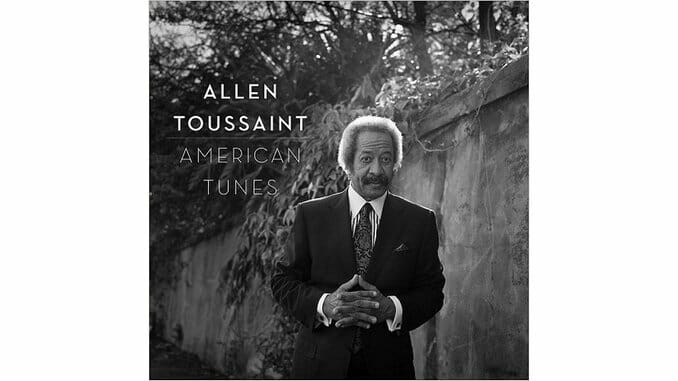Allen Toussaint: American Tunes

It’s still with a heavy heart that I have to write that American Tunes is the final batch of recordings that Allen Toussaint was working on before his death back in November 2015. The album marks his seventh decade in the music business, an amazing feat, which brings his career back full circle in recording a mostly instrumental album. In 1958, under the name Tousan, he recorded an album with some of NOLA’s finest musicians to create the rocking instrumental The Wild Sound Of New Orleans. Fifty-eight years later, his career swan song is American Tunes, which features only three tracks with vocals, two by Rhiannon Giddens (“Rocks In My Bed” and “Come Sunday”) and the closer “American Tune” with his own vocals.
Across 14 songs (with an additional three bonus tracks on the vinyl version), Toussaint looks back across the American music experience mostly through the jazz works by Bill Evans, Earl Hines, Duke Ellington, Billy Strayhorn and Fats Waller but also through a Gottschalk classical piece and the pop music of Paul Simon alongside Toussaint’s own work. It wouldn’t be a Toussaint album, however, without paying tribute to his beloved New Orleans, done so here through songs made popular by Professor Longhair in “Mardi Gras In New Orleans” and “Hey Little Girl.” Additionally, two of the three vinyl-only bonus tracks (“Her Mind Is Gone” and “Bald Head”) are done in a piano-only setting with “Her Mind Is Gone” having the slightest nod to the blues while the typically funny “Bald Head” is played with a loving, but tempered reverence. (The other bonus track is only one of the prettiest songs ever to be written, Henry Mancini’s “Moon River,” which is performed here as a duet with Toussaint on the keys and Greg Leisz on lap slide guitar.)
With half of the album devoted to the jazz realm, it feels like a proper follow-up to The Bright Mississippi from 2009 (which was also reissued on vinyl on June 10th), and it does indeed mark his first studio album released since then. On “Confessin’ (That I Love You),” popularized by the legendary Satchmo, Toussaint leads the band comprised of Jay Bellerose (drums), Bill Frisell (guitar) and David Piltch (bass) on a gorgeous strolling tune. After a brief solo piano intro, a jaunty rhythm accompanies the track that feels jovial, almost playful. As the song winds down with a ritardando, it feels as though love has been born and the couple settles in for a sentimental smooch.
For the vocal tracks, the Grammy-winning Rhiannon Giddens showcases why she is more than worthy to accompany this ensemble with her full-voiced take on Sir Duke’s “Rocks In My Bed” that imbues the blues with sultriness. On “Come Sunday” she utilizes her vibrato that pays a wonderful tribute to the gospel of Mahalia Jackson and occasionally sounds almost operatic. For a song that meanders from tender and delicate to a jazzy middle led by Charles Lloyd’s tasteful tenor sax solo, emotions ebb and flow for the listener. Finally, on Paul Simon’s “American Tune,” Toussaint provides his own sendoff in a performance sure to wet some eyes.
-

-

-

-

-

-

-

-

-

-

-

-

-

-

-

-

-

-

-

-

-

-

-

-

-

-

-

-

-

-

-

-

-

-

-

-

-

-

-

-








































